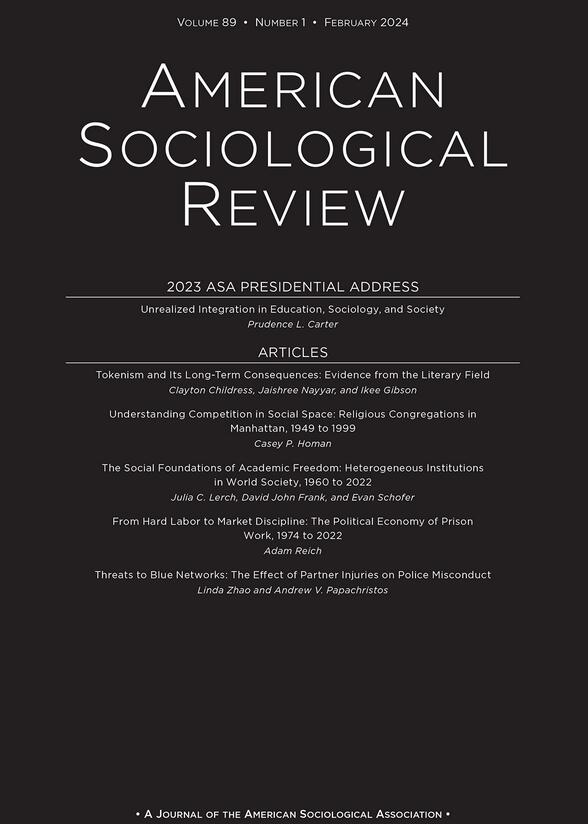From Bat Mitzvah to the Bar: Religious Habitus, Self-Concept, and Women’s Educational Outcomes
IF 6.2
1区 社会学
Q1 SOCIOLOGY
引用次数: 8
Abstract
This study considers the role of religious habitus and self-concept in educational stratification. We follow 3,238 adolescents for 13 years by linking the National Study of Youth and Religion to the National Student Clearinghouse. Survey data reveal that girls with a Jewish upbringing have two distinct postsecondary patterns compared to girls with a non-Jewish upbringing, even after controlling for social origins: (1) they are 23 percentage points more likely to graduate college, and (2) they graduate from much more selective colleges. We then analyze 107 interviews with 33 girls from comparable social origins interviewed repeatedly between adolescence and emerging adulthood. Girls raised by Jewish parents articulate a self-concept marked by ambitious career goals and an eagerness to have new experiences. For these girls, elite higher education and graduate school are central to attaining self-concept congruence. In contrast, girls raised by non-Jewish parents tend to prioritize motherhood and have humbler employment aims. For them, graduating from college, regardless of its prestige, is sufficient for self-concept congruence. We conclude that religious subculture is a key factor in educational stratification, and divergent paths to self-concept congruence can help explain why educational outcomes vary by religion in gendered ways.从成年礼到成年礼:宗教习惯、自我观念与女性教育成果
本研究考虑了宗教习惯和自我概念在教育分层中的作用。我们通过将全国青年与宗教研究与全国学生信息交换所联系起来,对3238名青少年进行了13年的跟踪调查。调查数据显示,与非犹太裔女孩相比,即使在控制了社会出身后,犹太裔女孩也有两种不同的中学后教育模式:(1)她们从大学毕业的可能性高出23个百分点;(2)她们从更具选择性的大学毕业。然后,我们分析了107次采访,采访对象为33名来自可比社会出身的女孩,她们在青春期和成年期反复接受采访。由犹太父母抚养长大的女孩表达了一种自我概念,其特点是雄心勃勃的职业目标和渴望拥有新体验。对这些女孩来说,精英高等教育和研究生院是实现自我概念一致性的核心。相比之下,由非犹太父母抚养长大的女孩往往优先考虑做母亲,就业目标也较低。对他们来说,从大学毕业,无论其声望如何,都足以实现自我概念的一致性。我们得出的结论是,宗教亚文化是教育分层的一个关键因素,而通往自我概念一致性的不同路径有助于解释为什么教育结果因宗教而异。
本文章由计算机程序翻译,如有差异,请以英文原文为准。
求助全文
约1分钟内获得全文
求助全文
来源期刊

American Sociological Review
SOCIOLOGY-
CiteScore
13.30
自引率
3.30%
发文量
35
期刊介绍:
The American Sociological Association (ASA) is a non-profit membership association established in 1905. Its mission is to advance sociology as a scientific discipline and profession that serves the public good. ASA is comprised of approximately 12,000 members including faculty members, researchers, practitioners, and students in the field of sociology. Roughly 20% of the members work in government, business, or non-profit organizations.
One of ASA's primary endeavors is the publication and dissemination of important sociological research. To this end, they founded the American Sociological Review (ASR) in 1936. ASR is the flagship journal of the association and publishes original works that are of general interest and contribute to the advancement of sociology. The journal seeks to publish new theoretical developments, research results that enhance our understanding of fundamental social processes, and significant methodological innovations. ASR welcomes submissions from all areas of sociology, placing an emphasis on exceptional quality.
Aside from ASR, ASA also publishes 14 professional journals and magazines. Additionally, they organize an annual meeting that attracts over 6,000 participants. ASA's membership consists of scholars, professionals, and students dedicated to the study and application of sociology in various domains of society.
 求助内容:
求助内容: 应助结果提醒方式:
应助结果提醒方式:


